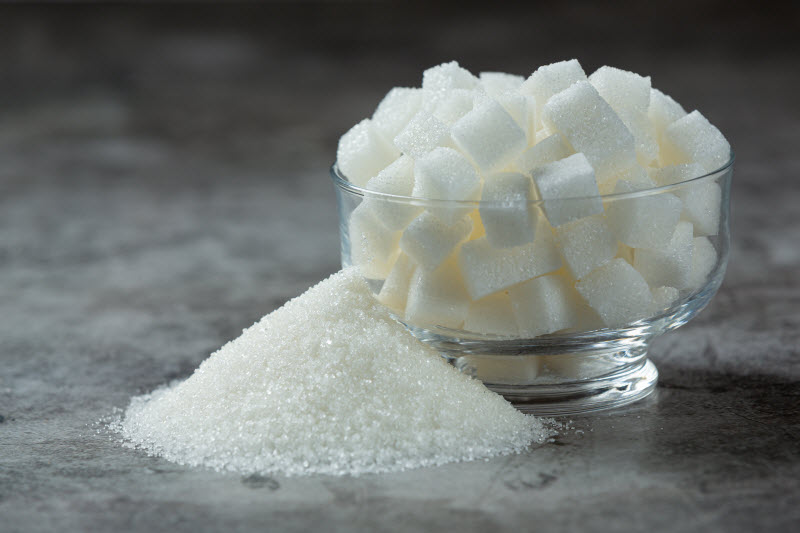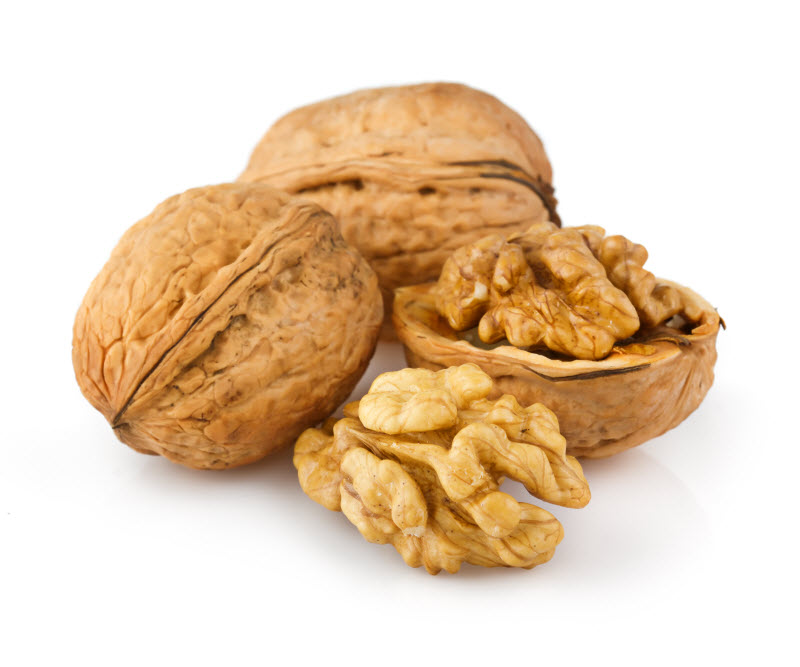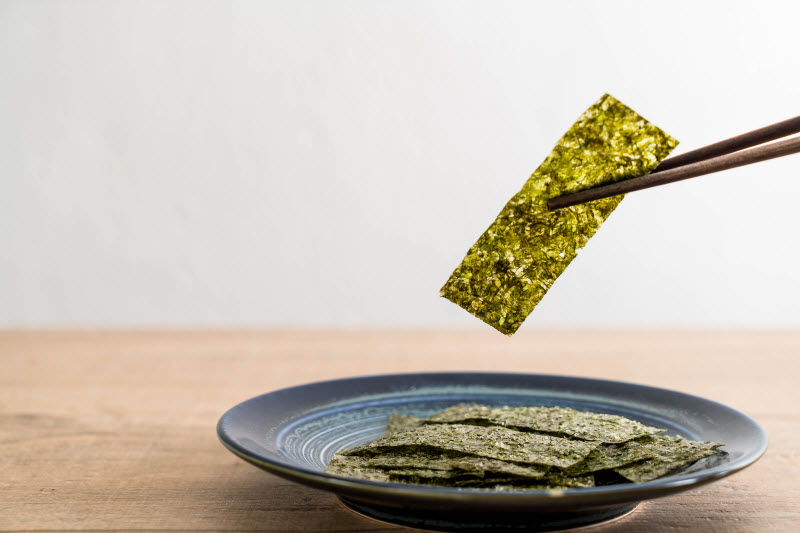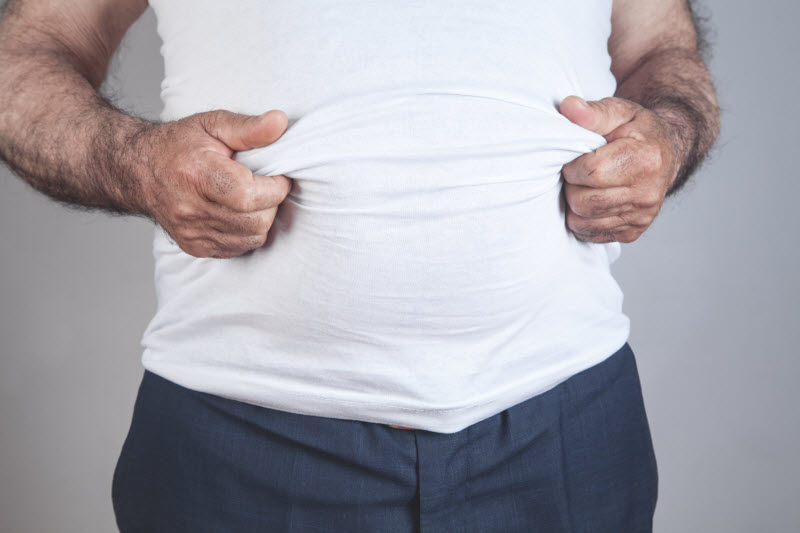
Ah, sweet sugar. It’s almost fair to say that we all have a love-hate relationship with sugar. We love it because it tastes amazing but hate the fact that it’s so bad for us. Yet, these little, tiny white granules are in almost all our foods that we crave, like candy, coffee, ice cream, whipped cream, and even fruit!
So how in the world could sugar, from the powdered form to the cubed form, be so dangerous? How could a simple small spoonful in your coffee or porridge do any harm?
Well, even if we don’t see or feel the effects right away, they might sneak up on us over time until it’s too late. That’s on top of the fact that we most likely already eat way more sugar than we should – at least two times the recommended amount. That means we’re consuming over 300 calories just from sugar alone![1] That’s a lot of sugar!
To put it short, sugar does a lot more harm than simply giving us a rush of sugar buzz and a present for our gullible taste buds.
Let’s take a look at 17 scary ways that sugar can potentially harm your health so that you’ll be armed with the knowledge to live a healthier lifestyle. Sounds sweet!
1- Increased Insulin Resistance
While your mouth and hungry stomach might be able to handle all that sugar, your body can’t do nearly as well. It all has to do with insulin. Insulin is a hormone your body produces that acts as your car, your fancy limo, or whatever you transport yourself with for the glucose in your blood.
What’s glucose? Well, it’s the sugar that you eat that’s running around your veins in your bloodstream. As you eat more and more sugary snacks, your glucose levels rise, and your insulin is supposed to help transport that glucose into your cells. There’s no collision or crash, and everything runs perfectly smooth. Or at least, that’s what’s supposed to happen if you eat a healthy balanced diet.
If you start to go crazy on the processed foods with a ton of artificial sugar, your tired body can’t keep up with your poor eating habits. Your precious insulin production will start to get messed up as a result. That soon leads to a haze of health hazards, like diabetes and metabolic syndrome[2].
2- Higher Risk of Heart Disease
Who knew that eating too many marshmallows or piping too much whipped cream into your mouth could possibly lead to heart disease? If you didn’t know before, it all comes down to a form of bad fat that gets produced when we eat too many sugar-rich foods often full of calories.
That bad fat’s got a name -- triglycerides. It’s actually formed in the same process that diabetes could form. After your glucose levels rise in your blood, your hard-working pancreas starts releasing that insulin to remove that sugar. Because your insulin levels become higher than normal, it sends a message to your liver. “Hey! it is time to transform that glucose into some triglycerides!”[3]
Your poor liver complies, not knowing any better. And as a result, if your triglyceride levels get too high, your risk for heart disease does increase. According to a Harvard study[4] conducted over 15 years, people who ate 25% of their daily calories from sugar were twice as likely to die from heart disease than those who had less than 10% of their calories consist of added sugars.
3- It Hurts Your Liver
There’s no question about it that the liver handles a lot of our bad decisions as best as it can. But did you know that the liver takes care of way more than just your alcohol and drinking sessions?
Yes, as you’ve guessed, it also helps to break your sugar overloads down. What you need to know about sugar is that it’s more than just glucose, or the useful part of sugar that your cells can use for energy. The other half of sugar is made up of fructose, otherwise known as the useless part, that only serves to expand your waistline and clothing sizes.
So, what does the body do with the useless part? Well, your liver must take care of it by metabolizing it and trying to convert it into glucose.
If you eat healthily, the liver can process a normal speed conveyor belt of fructose to convert. However, if you overload the conveyor belt, your liver will get stressed out. With not enough time, your liver desperately decides to take the extra fracture and turn it into...you guessed it, triglycerides.
In order words, you’ve strained your liver so much that it was forced to make bad fat for you. Not only that, but all that stress can lead to fatty liver disease[5] if left untaken care of, with the formation of fat droplets. No one wants a droopy liver!
It doesn’t take too much fructose to reach a breaking point with the liver.
Sometimes, a simple soda can or juice bottle can take you there. But have no fear! Try to eat less fructose-heavy foods or slow how fast you eat it. Exercising will not only do a huge favor to your liver, but to your weight as well.
4- Higher Weight Gain
While you might think too many McDonalds French fries or hamburgers lead to extra weight, now you know that sugar does too. Sugars are literally just empty calories without all the healthy vitamins and minerals that foods like fruits and vegetables would have.
And because sugar is quite addictive, you’re just adding more and more calories to your diet. If you’re a fan of sodas, you just might want to know that kids who drink the most sugar-filled drink were 55% more likely to be overweight compared to kids with the lowest intake[6]. (4)
Sugar can literally weigh you down quickly, so never forget about less sugar in your diet when you’re trying to slim yourself.
5- It Can Lead to Cancer
Now we know that glucose can be beneficial because it helps to feed our cells with that tasty energy they need to thrive. While unproblematic on the surface, the underlying issue is that the sugar feeds all the cells in our body...even the bad ones, like growing cancer cells.
Research has shown that too much sugar might lead to breast, colon, liver, and pancreatic cancer one day[7][8][9][10]. While the connection isn’t totally clear, the triglycerides, glucose, and insulin together might impact the pathways we have that can cause cancer cells to grow and multiply.
To these destructive cells, the sugar we feed them is literally like how our cars gobble up all that gas we pump. Like a strong vampire with a magnet, they just suck up all the glucose from our blood before it has a chance to find a way to our healthy cells. The funny part is that we’re giving the cells all the gas, and they don’t even pay us back!
It should be a no-brainer now that cutting down on sugar should be a part of any cancer prevention diet.
6- Sugar is Addictive
You know that feeling you get when there’s a bulk pack of candy sitting next to you and your hand somehow always instinctively reaches in and pops a few pieces in your mouth? We all know it too well, but did you know that this sweets addiction has more to do with your brain than just pure taste and craving?
In fact, your addiction to sugar might almost be as similar as a drug addiction. No, this does not mean eating sugar is the same as taking drugs, so relax and take a deep breath. The only part that’s comparable is the effects on the brain. See, when you eat sugar, your brain is happy!
You feel that sense of happiness from a few chemicals that are released, namely opioids and dopamine. Some of the same chemicals are released when you take drugs as well[11]. According to some brain scans done by PositiveMed, sugar is almost just as addictive as cocaine! Luckily, there are medications out there that can help to treat sugar addiction[12].
They’re some of the same methods used to treat nicotine addiction, so seek them out if you feel you need help to curb the sweets.
7- More Uric Acid
When you think of waste products that your body produces, you might automatically think of poop and pee. A waste byproduct in that poop and pee is called uric acid. Where does it come from?
Well, when you have too much fructose in the liver, your liver will not only churn out triglycerides, but also uric acid. Low levels of uric acid are perfectly fine, but just like how anything in excess can be bad, too much uric acid can build up in your blood before it can down the toilet. That might lead to a higher risk in heart and kidney disease.
So, when it really comes down to it, fructose really is the innocently sweet on the surface but deadly on the inside culprit of your classic storybook.
8- It Can Age Your Skin Faster
Sugar not only has effects on the inside, but also effects on the outside. Sadly, this comes in the form of your skin through a process called glycation. This process is when proteins and fats get into contact with the sugar in your bloodstream.
For some reason, this combo decides to wreak havoc on your skin by forming into a fancy name called Advanced Glycation End products, otherwise known as AGEs. These AGEs make up their mind to make you skin dull and increase the formation of wrinkles. They essentially cause damage to collagen and elastin, two proteins we take for granted that give our skin the firmness and strength that it has. Basically, if you consume more sugar, you’re just racking up the AGEs and aging your skin faster[13].
If you’d read this far, don’t think in a mindset of worry and fear about the harmful effects you could put on yourself. Instead, think in a mindset about all the things you could gain. For example, if you eat less sugar, you’ll gain healthier and younger looking skin. You’ll also be much thinner and healthier.
9- You’ll Be More Hungry
You might have experienced this quite commonly -- you eat a snack high in carbs and sugar and while your taste buds might be writhing in joy, your stomach still feels a little empty for some reason, like you’re not settled in. Turns out, it’s just your hormones that have been messing with you all along.
There are two main ones that regulate our hunger. The first one is ghrelin. Ghrelin is the one that lets us know we’re hungry! It also activates our stomach to rumble, so the next time you sit in a quiet room and your stomach decides to roar like a beast, you can thank your ghrelin.
On the other hand, leptin is the hormone that turns off your hunger when it thinks you’ve eaten enough. What’s interesting is that when it comes to fructose, these two hormones have a tough time trying to recognize it and knowing what to do when it encounters it. As a result, your ghrelin doesn’t know when to shut off and your leptin just isn’t really activated. It causes you to still feel hungry and unsatisfied even if you’ve already eaten, and you’ll never feel full.
You can probably tell that this will lead to a lot of overeating and an overextending belly[14]. The next time you find yourself eating sugary snacks, ask yourself if you’re just overeating at the point. Use your brain to take over when your hormones start acting weird!
10- It Leads to an Increase of Free Radicals
No, these are not your average free radicals who are highly involved in politics and eating high amounts of sugar will not turn you into a radical thinker. The other type of free radicals are unpaired electrons that can be dangerous in your body by raising your risk for inflammation, disease, and cancer.
Even if the science confuses you on what exactly unpaired radicals are, the most important takeaway is that they should stay away from your body and your diet. However, if you have a diet that’s very high in sugar, it can lead to an increase of these free radicals in your body. It also can lower your antioxidant levels in the blood as well[15]! Luckily, the solution to all these potential health issues is just to cut down on your sugar. Also, don’t forget to load up on antioxidant healthy foods like veggies and fruits with natural sugars, not artificial!
11- It Can Harm Your Teeth
Finally, we’ve gotten to the warning that your dentist and parents always have to remind you about, especially at holiday time! It’s that classic lecture we’ve heard so many times that we can already recite it in our heads about brushing often, needing to floss a lot more, and especially cut down on sugary candies.
Even though we know the advice all too well, it’s still good advice and shouldn’t be taken lightly anymore. Take Nigeria for an example. Their diet consists of virtually almost no sugar at all, so only 2% of their population have had some form of tooth decay[16]. Now that you know, you’ll definitely be sure to brush twice a day, floss a whole lot more, and most importantly what? That’s right -- cut sugar from that diet!
12- Higher Risk of Forgetting
Stereotypes and movies have usually grounded in us that you only develop a high risk of Alzheimer’s and Dementia when you’re old and wrinkled. However, that couldn’t be further from the truth. If you’ve ever heard of the saying that you are what you eat, it’s completely valid because your diet directly affects your brain’s function and structure in a lot of ways. Eating foods that have tons of processed sugar and fat in them can impact how you make and remember your memories. This factor is what is usually impacted when Alzheimer’s starts to develop[17][18].
No one wants to forget where their keys are when they’re right in front of them early on. If you don’t want to be in the same boat, you by now already know what you need to do.
13- Increases Risk of Diabetes
Diabetes ranks side by side with tooth decay as the most obvious effects of too much sugar. However, this one’s serious. Eating too much sugar can inhibit that precious insulin and as a result, your blood sugar is always dangerously high. If this consistently happens, you’re at high risk for developing diabetes.
If you don’t do anything about it, diabetes will not be fun for many of your body parts like your teeth, kidneys, heart, nerves, and eyes. Never forget to be mindful of what you eat. Try not to only cut sugary foods out of your diet, but also those extremely sweet beverages and sodas.
14- It Can Make You Feel More Tired
As if your busy life doesn’t drain your energy enough, you’ve now got sugar to worry about[19]. Have you ever remembered eating a sugary snack and then getting a sudden sugar rush followed by a massive wave of tiredness or sluggishness?
That’s all thanks to the sugar! Orexin cells are the ones that keep you awake, energized, and feeling your best. When you eat sugar, it finds a way to suppress those cells so that you just want to lie in bed all day more than you probably already want to do. If you’ve ever had the urge to take a big nap after you ate a big meal, you might have sugar as the culprit in the scheme.
15- Higher Risk of Weakening the Bones
Sugar can literally disrupt the very foundation of your body by potentially weakening your bones over a long period of time. In an animal study that was conducted, researchers found that a high carb diet actually gave several of the animals disturbances in the bone.
Even though our highest sympathies go out to those slightly weaker animals, the study gives a good warning about eating too much sugar. The AGEs mentioned before not only age your skin, but also your bones as well[20]. It can build up easily, so that’s why lots of people with diabetes will potentially be more at risk for bone fractures.
16- It Can Lead to Gout
If you’ve never heard of gout before, consider that as a great thing. That’s because it’s a really painful condition that involves the buildup of uric acid in your bloodstream and resultantly, solid crystals form in your joints. Ouch! What accompanies those unwanted solid crystals is joint pain, stiffness, and swelling.
The symptoms aren’t too bad, but immobilization is something you do not want when you can avoid it. That all starts with your diet and the amount of sugar you eat. Follow a healthy routine and your crystal-free joints will surely thank you.
17- Your Blood Pressure Might Increase
Lastly, sugar always seems to make most of its mark on the bloodstream. A high intake of sugar and fructose could very well lead to higher blood pressure, which means that your heart just works harder than it needs to pump blood in your body[21]. So once again, be sure to lower your intake of sugar so your body doesn’t need to work more than it needs to.
Conclusion
In conclusion, even though sugar might look sweet on the outside, don’t fall for the risks once it’s inside of you. Of course, we all get a sweet tooth or craving occasionally, but don’t let it get too overboard. Have a few bites of that cake and that ice cream tub, but don’t eat it all in one sitting.
You’ll not only feel low on energy a few hours later, but all that sugar will add to your health risks later in life whether you feel it or not. As science shows, you’ve got to ease up on that sugar. Eat with moderation, watch your portion sizes, and treat yourself once in a while. If you’re really craving some sweetness, stock up on some fruits with natural more healthy sugars that are good for your body. Grab some sugar-free goods and pay attention to those labels, because they’re not there for your lazy eyes to gloss over.
If you’re feeling particularly ambitious, you can attempt to add a no sugar diet to your routine. While these diets can be hard at first, you’ll quickly start to feel the rewards and healthy benefits. No matter what you do in the future, now you’re armed with all the knowledge to attack the sugary white substance head on and never let it trick you again. You’ve got this.










Discussions
Add Comment